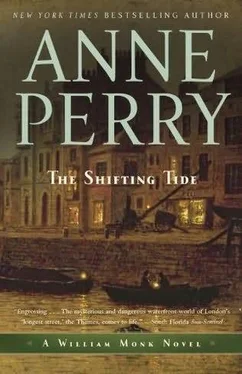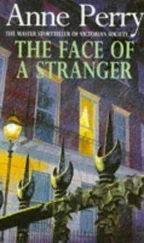Anne Perry - The Shifting Tide
Здесь есть возможность читать онлайн «Anne Perry - The Shifting Tide» весь текст электронной книги совершенно бесплатно (целиком полную версию без сокращений). В некоторых случаях можно слушать аудио, скачать через торрент в формате fb2 и присутствует краткое содержание. Жанр: Исторический детектив, на английском языке. Описание произведения, (предисловие) а так же отзывы посетителей доступны на портале библиотеки ЛибКат.
- Название:The Shifting Tide
- Автор:
- Жанр:
- Год:неизвестен
- ISBN:нет данных
- Рейтинг книги:5 / 5. Голосов: 1
-
Избранное:Добавить в избранное
- Отзывы:
-
Ваша оценка:
- 100
- 1
- 2
- 3
- 4
- 5
The Shifting Tide: краткое содержание, описание и аннотация
Предлагаем к чтению аннотацию, описание, краткое содержание или предисловие (зависит от того, что написал сам автор книги «The Shifting Tide»). Если вы не нашли необходимую информацию о книге — напишите в комментариях, мы постараемся отыскать её.
The Shifting Tide — читать онлайн бесплатно полную книгу (весь текст) целиком
Ниже представлен текст книги, разбитый по страницам. Система сохранения места последней прочитанной страницы, позволяет с удобством читать онлайн бесплатно книгу «The Shifting Tide», без необходимости каждый раз заново искать на чём Вы остановились. Поставьте закладку, и сможете в любой момент перейти на страницу, на которой закончили чтение.
Интервал:
Закладка:
“No,” Louvain said. “River thieves know how to come alongside and board in silence. Hodge was the only one they encountered, and they killed him without arousing anyone else.”
Monk tried to imagine the scene: the cramped spaces in the bowels of the ship, the floor shifting and tilting with the tide, the creaking of the ship’s timbers. And then would come the sudden knowledge that there were footsteps, then the terror, the violence, and finally the crippling pain as they struck.
“Who found him?” he said quietly. “And when?”
Louvain’s face was heavy, his mouth drawn tight. “The man who came to relieve him at eight o’clock.”
“Before or after he saw the ivory was missing?”
Louvain hesitated only a second. It was barely discernible, and Monk wondered if he had imagined it. “After.”
If he had said before , Monk would not have believed him. In self-preservation the man would have wanted to know what he was dealing with before he told Louvain anything. And unless he were a complete fool, he would have thought first to make sure the killer was not still on board. If he could have said he had captured him, and kept the ivory, he would have had a very different story to tell. Unless, of course, he already knew all about it and was party to it?
“Where were you when you got the message?”
Louvain looked at him stonily. “Here. It was nearly half past eight by then.”
“How long had you been here?”
“Since seven.”
“Would he know that?” He watched Louvain’s face closely. One of the ways he could judge the men left on the ship was by Louvain’s trust in them. A man in Louvain’s position could not afford to forgive even error, let alone any kind of disloyalty.
“Yes,” Louvain replied, a flicker of amusement in his eyes. “Any seaman would expect it. That doesn’t tell you what you think it does.”
Monk felt the heat burn up inside him. He was clawing after answers, not grasping as he usually did. This was not the right pace at which to play games of wits with Louvain. He must be either blunter or a great deal more subtle.
“All shipowners are in their offices at that hour?” he concluded aloud.
Louvain relaxed a little. “Yes. He came here and told me Hodge had been killed and the ivory stolen. I went with him immediately-” He stopped as Monk stood up.
“Can you retrace your steps, and I’ll come with you?” Monk requested.
Louvain rose smoothly. “Of course.” He said nothing else as he led Monk across the worn carpet to the heavy door, opened it and then locked it behind them, putting the key in the inside pocket of his waistcoat. As he took a heavier jacket from a coat stand, he glanced at Monk’s attire, as if to consider its adequacy, and decided it would suffice.
Monk was proud of his clothes. Even in his most financially restricted times, he had dressed well. He had a natural elegance, and pride dictated that the tailor’s bill had come before the butcher’s. But that had been when he was single. Now he might have to reverse that order, and it already weighed heavily with him. It was a kind of defeat. However, he had realized that a man involved in shipping, as Louvain was, might well have business that required them both to go on the river, so he had come with that in mind. His boots were heavy and well soled; his overcoat was easy to move in and would cut the wind.
He followed Louvain down the stairs and across the outer office, where clerks were bent over ledgers or sitting on high stools with quills in hand. The odors of ink and dust were in the air, and there was an acrid sting of smoke as he passed the iron heating stove just as someone opened it to put more coke in the top.
Outside in the roadway towards the dock, the raw-edged wind struck them immediately, making the skin smart, whipping the hair back, catching in the throat the taste of salt on the incoming tide. It was heavy with smells of fish, tar, and the sour, overbearing effluent of mud and sewage from above the waterline beyond the wharves.
The water slurped against the pier stakes in endless movement, rhythm broken now and then by the wash of barges laden so they sank deep. They moved slowly upriver towards London Bridge and beyond. The mewing of gulls was shrill, yet it was a sound that brought back echoes of meaning for Monk, flashes of his life in Northumberland as a boy. A carriage accident seven years before, in 1856, had robbed him of most of those many-colored fragments that build the past and form the pictures of who we are. By deduction he had pieced much of it together, and now and again windows opened suddenly and showed him whole landscapes for a moment. The cry of gulls was one of those.
Louvain was crossing the cobbles down to the wharf and striding along without looking right or left. The docks, with their vast warehouses, cranes and derricks, were all familiar to him. He was used to seeing the laborers and watermen and the small craft coming and going.
Monk followed Louvain to the end of the wharf, where the dark water swirled and slapped under the shadows, its surface spotted with scum and drifting refuse. On the far bank there was a stretch of mud below the tide line, and three children were wading in it, sunk halfway up to their knees, bent over, searching with busy, skilled hands for whatever they could find. A snatch of memory told Monk it was almost certainly for coal off the barges, fallen by chance, or deliberately pushed a piece at a time, precisely in order to be picked up by the mudlarks.
Louvain waved his arm and shouted across the water. Within moments a light boat, twelve or fourteen feet long, drew up to the steps with a single man aboard at the oars. His face was weather-beaten to the color of old wood, his gray beard little more than bristle, and his hat, jammed down over his ears, hid whatever hair he might have had. He gave a brief, half salute of recognition and waited for Louvain’s orders.
“Take us out to the Maude Idris ,” Louvain told him, stepping easily down into the boat, adjusting his weight to keep his balance as it tipped and jiggled. He offered no assistance to Monk behind him, either assuming he was accustomed to boats or uninterested in whether he made a fool of himself or not.
A moment of fear rose in Monk, and embarrassment in case he did it clumsily. He stiffened, and then physical instinct told him that was wrong, and he dropped down loosely, bending his knees and adjusting with a grace that surprised both of them.
The waterman wove between the barges with practiced skill, skirting around a three-masted schooner, its canvas lashed, timbers stained and peeling from long days of tropical sun and salt wind. Monk glanced down and saw the crusting of barnacles below the waterline. The river was too murky for him to see more than a foot or so below the surface.
He looked up quickly as they passed under the shadow of a much larger ship and caught his breath with a sudden thrill as the sheer beauty of it gripped him. It towered into the air, three tremendous masts with yardarms eighty or ninety feet long and dark against the gray clouds, sails furled, rigging in fine lines like an etching on the sky. It was one of the great clippers that sailed around the world, probably racing from China to London with tea, silk, and spices of the Far East. First one to unload won the stupendous prices, second got only what was left. His imagination teemed with visions of roaring winds and seas, worlds of sky, billowing canvas, spars thrashing in a wild dance of the elements. And there would be calmer seas, flaming sunsets, clear water like glass teeming with creatures of myriad shapes, and windless days when time and space stretched into eternity.
Monk jerked himself back to the present and the loud, busy river, the cold spray off the water whipping his face. Ahead of them was a four-masted schooner lying at anchor, rolling slightly on the wake from a string of barges. She was wide beamed and quite deep of draft, an oceangoing carrier of heavy cargo, swift under full sail, easy to maneuver, and this close, the gun ports on the foredeck were plain to see. She would be neither caught nor captured easily.
Читать дальшеИнтервал:
Закладка:
Похожие книги на «The Shifting Tide»
Представляем Вашему вниманию похожие книги на «The Shifting Tide» списком для выбора. Мы отобрали схожую по названию и смыслу литературу в надежде предоставить читателям больше вариантов отыскать новые, интересные, ещё непрочитанные произведения.
Обсуждение, отзывы о книге «The Shifting Tide» и просто собственные мнения читателей. Оставьте ваши комментарии, напишите, что Вы думаете о произведении, его смысле или главных героях. Укажите что конкретно понравилось, а что нет, и почему Вы так считаете.












